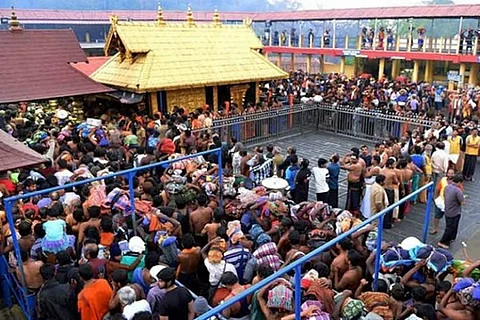

The Supreme Court has agreed to hear 49 review petitions against its September 28 verdict allowing women of all ages entry into the Sabarimala temple. The SC announced January 22, 2019 as the date for an open court hearing, which is a hearing to which the public has a right to be admitted, on this issue. It has also decided to hear fresh writ petitions on this issue in open court on the same day. And until then, the September 28 order allowing women of all ages entry into Sabarimala will apply.
The petitions were heard by a five-judge bench in a closed hearing in the chambers of Chief Justice of India Ranjan Gogoi at 3 pm. The bench comprised of CJI Ranjan Gogoi, Justices Rohinton Nariman, AM Khanwilkar, DY Chandrachud and Indu Malhotra. "All the Review Petitions along with all pending applications will be heard in Open Court on 22nd January, 2019 before the appropriate Bench. We make it clear that there is no stay of the judgment and order of this Court dated 28th September, 2018 passed in Writ Petition (Civil) No.373 of 2006 (Indian Young Lawyers Association & Ors. vs. The State of Kerala & Ors.)," the court in its order said.
The review petitions relied heavily on the dissenting judgement of J Indu Malhotra, the only female judge on the bench, who had contended that constitutional parameters of rationality cannot be applied blindly to matters of faith.
There were a few main contentions in the review petitions, which will be elucidated in open court. One of the main contentions was that the original petitioners in the case, the Delhi-based Indian Young Lawyers’ Association, did not have locus standi or the right or capacity to bring a case to court, in this matter. The petitions claim that no women Ayyappa devotee would want to enter this temple, and hence the Court should never have heard this case filed by a group, which is alien to the temple’s customs.
The petitions also claimed that the Court erred in its ruling that the ban on women entering the temple was based on the physiological nature of women. It contended that it was actually based on the “eternally celibate” nature of the deity, and hence the ban was not insulting the dignity of women.
Reacting to the latest developments, Devaswom Minister Kadakampally Surendran told reporters, "The government has made it clear that whatever the Supreme Court says, we will follow. We are not changing from that stand."
Sabarimala thanthri family head Kandararu Rajeevaru has told reporters that he welcomes the SC's decision to hear arguments in open court.